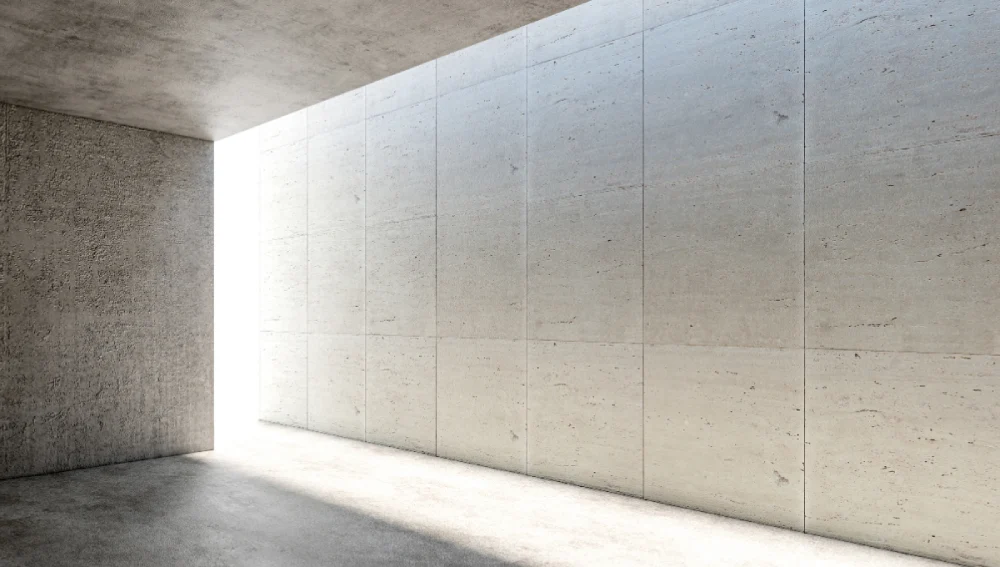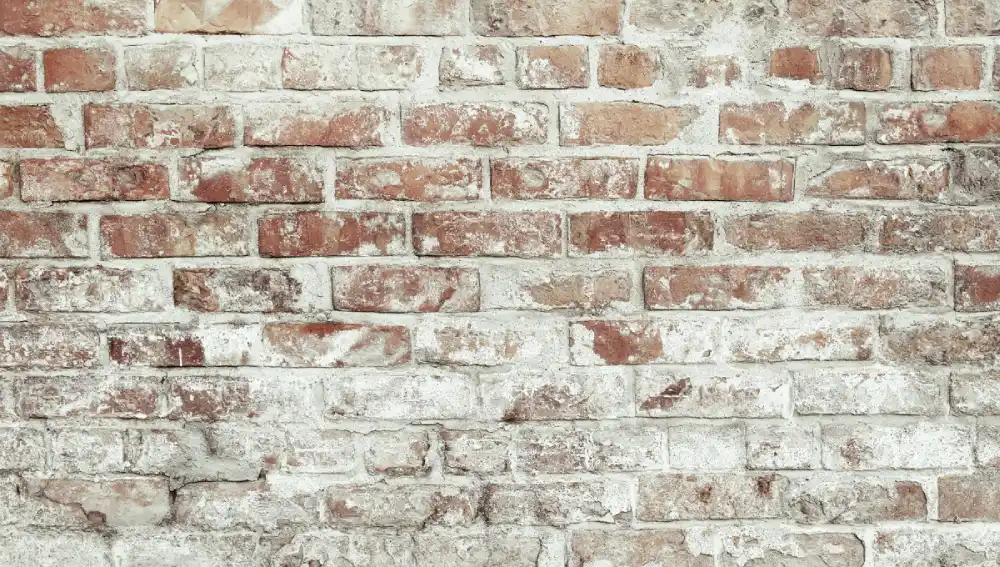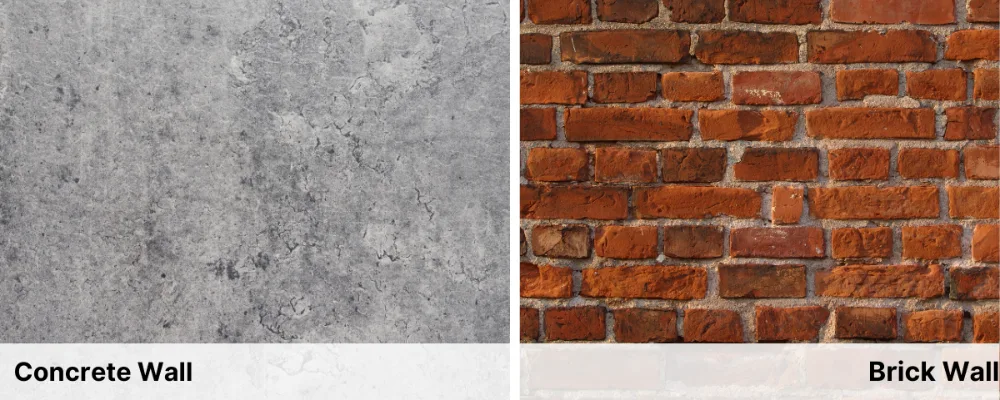Concrete wall or brick wall—choosing between them is a common debate in every construction project. Generally, builders or homeowners need careful consideration of fundamental building materials to improve their strength and longevity. But the choice between concrete blocks and bricks can be confusing.
Both materials are popular in their own way, with distinctive characteristics and advantages. Understanding their detailed purpose may clear your perspective and help you make informed decisions for your construction projects.
This article delves into the comparison of both concrete and brick walls, including their durability, insulation, weight, strength, and fire resistance. By the end, you’ll have a clearer understanding of which material can fit your needs.
Concrete Wall

A concrete wall is constructed of blocks of uniform size. Its normal size is 8 inches, although dimensions may vary according to the guidelines and requirements of the engineer. A structure made up of concrete blocks can deteriorate if not treated properly.
Concrete blocks are made by pouring a mixture of sand, cement, and coarse aggregates into the framework mold and allowing it to harden. It is best suited for load-bearing structures, transferring loads from floors to the foundation or the wall below.
Benefits of Concrete Walls
- Insulation: The concrete wall provides reasonable insulation to the buildings, which helps maintain the required indoor temperatures and reduces energy costs. However, their insulation properties can be enhanced using insulated concrete forms (ICFs).
- Budget-friendly: Concrete blocks are a cost-effective option, especially for large-scale construction projects. The cost of solid concrete blocks starts at Rs 40 to 50 per piece. The cost of a block can vary based on its thickness, finishing, and reinforcement. Based on your construction needs, choose the suitable one.
- Strength and Durability: Concrete walls are ideal for load-bearing walls and foundations. They are capable of withstanding maximum weight and pressure and are resistant to pests, fire, and weather.
- Design Flexibility: Concrete blocks can be tailored to the required architectural designs. Architects or designers can add unique shapes and custom features to their homes. They are extremely flexible and can complete the construction process without delaying production.
- Soundproof: The mass and rigidity of concrete walls effectively reduce the transmission of unwanted noise into the space.
- Eco-friendly: Using concrete blocks in the construction project reduces waste as the builders can produce an exact amount of concrete. Meanwhile, any waste can be reused or recycled for other construction work.
Brick Wall

A brick wall is a vertical structure widely used for both interior and exterior purposes. The most common brick size is 215 mm x 102.5 mm x 65 mm (length x width x height).
Bricks are primarily composed of clay and other recycled materials, shaped into rectangular blocks. They come in different types, such as solid brick walls, veneer walls, and cavity walls, each containing ideal characteristics for various purposes.
Benefits of Brick Walls
- Aesthetically Appealing: Beyond their strength, brick walls offer a stunning and personalized look. They are identified in numerous styles, colors, and textures, enhancing the entire building’s appearance.
- Fire Resistance: A brick wall is an ideal option for structures in areas susceptible to fires. The type of mortar used in the brick influences the fire-resistance properties, preventing extreme heat from traveling inside.
- Strength: Bricks can support significant loads without causing any damage or cracks to the floors or foundations, making them suitable for load-bearing structures.
- Resale Value: Buildings with brick walls contribute to higher resale value, creating a positive first impression. The primary qualities associated with bricks are solidity, durability, and traditional craftsmanship, which are potentially noted by buyers.
- Durability: Bricks are a natural material that offers excellent durability to structures and reduces the risk of cracks or damages. They are highly resistant to wear and tear, promoting building longevity with minimal maintenance.
Concrete Wall vs. Brick Wall
This table includes a general comparison of significant parameters. Specific properties may be due to factors such as construction methods, brick type, and wall thickness.
| Features | Concrete Wall | Brick Wall |
| Material | Concrete blocks are composed of cement, water, and aggregates, manufactured through the molding process. | Traditionally made from clay, sometimes they include recycled materials or concrete. |
| Application | Due to their extensive strength, concrete blocks are pretty suitable for retaining walls, load-bearing walls, industrial buildings, and foundations. | Bricks are versatile and used in various construction projects, including exterior walls, partition walls, chimneys, and interior bearing walls. |
| Strength | The characteristic compressive strength of concrete varies significantly, with grades categorized from M10 (10 N/mm²) to M60 (over 60 N/mm²), demonstrating that concrete generally provides superior strength compared to bricks. | The compressive strength of burnt clay bricks typically ranges from a minimum of 7.5 N/mm² for Class 7.5 to over 35 N/mm² for higher grades. |
| Cost | Concrete blocks are cost-effective, especially for large-scale construction projects. | It can be expensive, depending on the brick type, production methods, and region. |
| Ease of Construction | Concrete walls are easy to construct due to the uniform size of the blocks. | Brick walls often require skilled laborers, especially when dealing with intricate designs. |
| Modification | Concrete walls are difficult to modify, often involving demolition. | They are easy to modify, but the cost of labor increases. |
| Durability | Concrete blocks are highly durable and resistant to pests and weather. | Bricks can withstand any harsh weather conditions without causing any damage. |
Conclusion
The priorities and specific needs of individuals are different. Choosing between a concrete wall and a brick wall typically depends on the type of structure and project needs. Similarly, when you compare RCC walls and Brick walls, RCC walls share similar properties with Concrete walls. Consider certain significant factors, like the purpose of the wall, budget constraints, weather conditions, and maintenance requirements, to make a better decision. If you’re unsure about which material to choose, consult your professional builder for accurate guidance.
FAQs
Concrete wall construction is generally cheaper than brick. However, the cost is literally based on the type of brick, the region, and the production method. Concrete walls provide substantial strength and durability, making them a cost-effective option.
In general, concrete walls typically have greater sheer strength compared to brick walls. Concrete is particularly effective at handling heavy loads and bending moments, making it superior in structural applications where these forces are present. Although high-quality clay bricks can exhibit significant compressive strength, conventional concrete walls generally outperform brick walls in strength and durability in various applications.
The choice of material differs based on the specific project requirements. Both offer unique characteristics; concrete walls can provide excellent structural strength, while brick walls offer an aesthetic look and versatility. By comparing your project’s needs with these functionalities, choose the one that best fits you.

